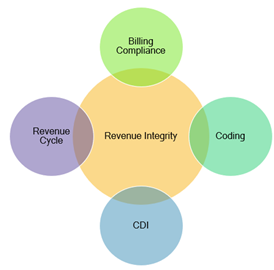In this 7-part series, we will explore the tactics you can employ to build and optimize a revenue integrity team designed to create measurable value for your organization.
The revenue integrity function within healthcare organizations has been going through an evolution of the last 10 years. No longer is revenue integrity simply a department that focuses on chargemaster maintenance. A modern revenue integrity team monitors and supports all the processes that support revenue generation, capture and reconciliation. Beyond that, revenue integrity should also be ensuring regulatory compliance and preventing revenue loss.
Organizations structure their teams in a variety of ways. In some organizations, you will find revenue integrity is a department, in others it may be a team or committee. Regardless of how the team is structured, it is critical that the people on your team have a solid understanding of, and relationship with the other teams that touch revenue creation and management. These teams include:
committee. Regardless of how the team is structured, it is critical that the people on your team have a solid understanding of, and relationship with the other teams that touch revenue creation and management. These teams include:
- Billing compliance
- Coding
- CDI (Clinical Documentation Investigation)
- Revenue Cycle
Some of the skills you should look for in your team members include:
- Knowledge of all aspects of healthcare revenue cycle functions, including registration, coding and documentation standards, billing and collection processes, as well as government and payer regulations.
- Knowledge of CMS regulations, medical terminology and the various data elements associated with all types of claim forms.
- Ability to assess data and processes to develop and implement performance improvement opportunities.
- Ability to conduct and interpret qualitative and quantitative analysis, financial analysis, healthcare economics and business processes, information systems, organizational development, healthcare delivery systems, project management or new business development.
As you can see, the goal is to expand the scope of your revenue integrity team to have a broader view of revenue opportunities and risks. By doing this, you can break down the silos and have everyone in your organization working together towards a common goal instead of having disparate teams addressing the same issues, but each in a different way. When you centralize the flow of information, it is easier to see common themes and identify solutions to address those challenges.
Next up in the series we will discuss a process for driving positive outcomes through communication.
Interested in learning more about creating a value generating revenue integrity team right now? Click to watch our on-demand webinar!



